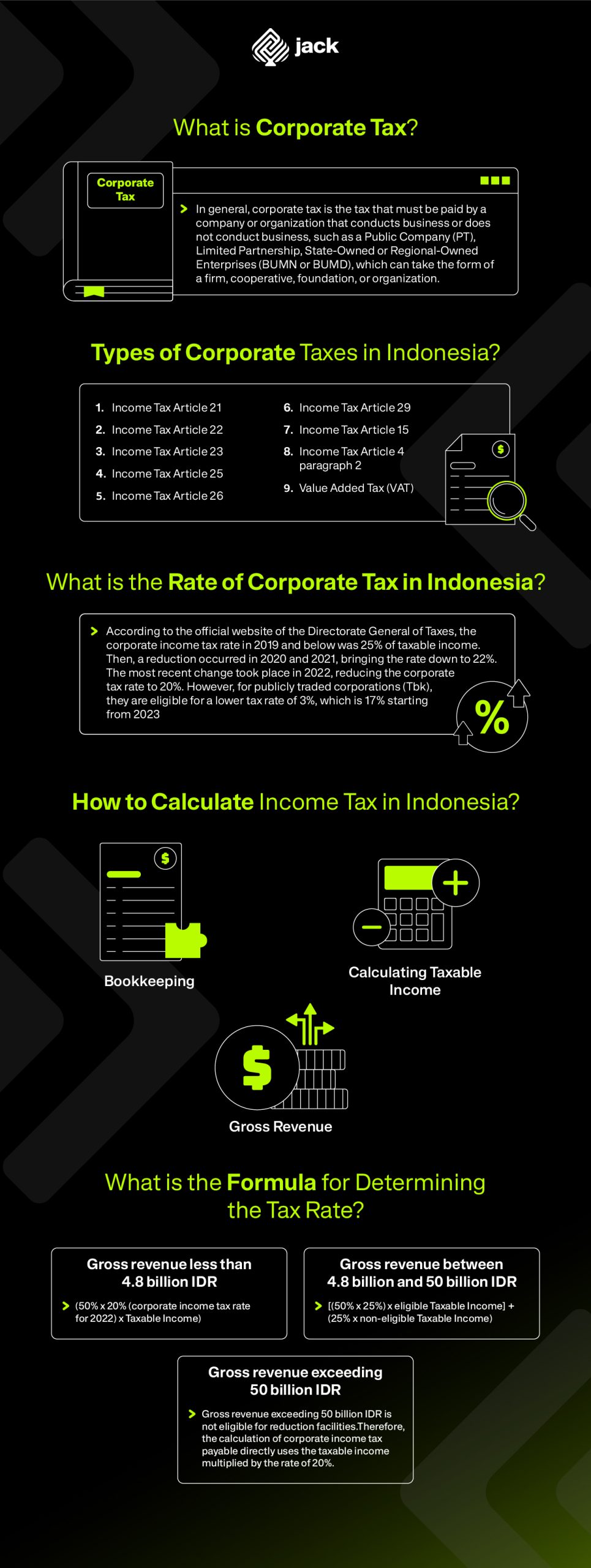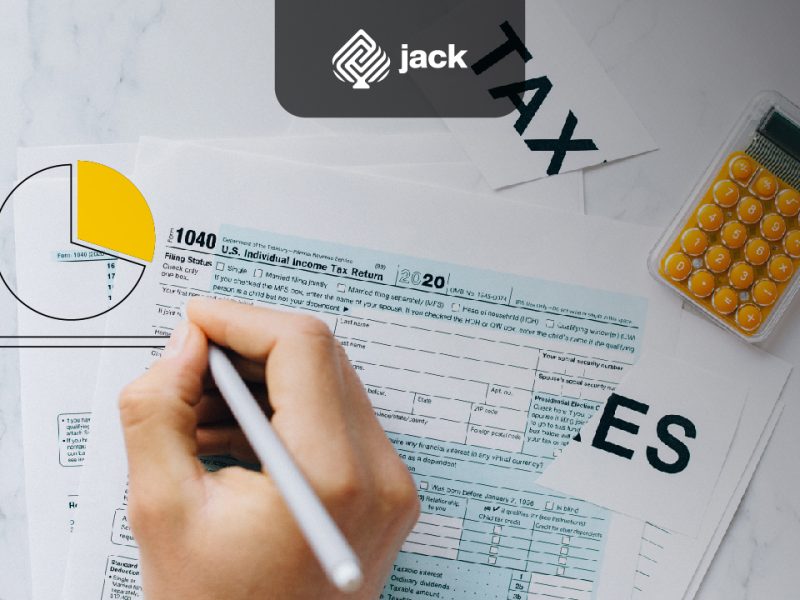For some people, just hearing the word “tax” can make their heads spin because they immediately imagine complicated calculation formulas. Are you one of them?
If so, don’t worry! This article will take you into the world of taxes, especially corporate taxes, in easily understandable language. As a business owner, you can gain a better understanding of the tax world in business.
Without further ado, let’s dive into the complete information about corporate taxes, from understanding the concept, types, to the calculation formulas in this article.
What is Corporate Tax?
According to the General Provisions and Procedures of Taxation Law (UU KUP) Number 28 of 2007, Article 1, Paragraph 1, tax is a mandatory contribution to the state owed by individuals or entities imposed by law, without receiving direct compensation, and used for the needs of the state for the greatest possible prosperity of the people.
The above law clearly states that taxes are not only imposed on individuals but also on corporations.
So, what is corporate tax or also known as business tax?
In general, corporate tax is the tax that must be paid by a company or organization that conducts business or does not conduct business, such as a Public Company (PT), Limited Partnership, State-Owned or Regional-Owned Enterprises (BUMN or BUMD), which can take the form of a firm, cooperative, foundation, or organization.
The money collected from this tax will be used by the government to finance various programs and government activities. That is why corporate tax is considered essential in maintaining the existence of a country’s economy.
Types of Corporate Taxes in Indonesia?
There are several types of taxes that must be reported and paid by corporate taxpayers, whether they are PTs, CVs, firms, or others, including:
1. Income Tax Article 21
This article governs the imposition of tax on employees of a company. Usually, the company will directly deduct the tax from the employees’ salaries.
Furthermore, Article 21 applies to employees’ wages, salaries, allowances, bonuses, and others. The amount of deduction varies for each employee, depending on their Taxable Income (PKP).
2. Income Tax Article 22
Based on Article 22, this tax is imposed on companies engaged in the export or import of luxury goods.
The requirements for imposing this tax are that the export and import activities conducted must benefit both parties involved in the transaction.
3. Income Tax Article 23
Based on Article 23, this tax is imposed on taxpayers when certain transactions or activities occur, such as:
- Dividend distribution to shareholders.
- Royalties paid for a work.
- Payment of loan interest.
- Payment of bonuses, gifts, or awards.
- Payment for consultant services as stated in the Minister of Finance Regulation Number 141/PMK.03/2015.
- Payments for land rent, buildings, or the use of other assets.
4. Income Tax Article 25
Article 25 governs the type of company tax in the form of installments on the tax due. This refers to the total Annual Income Tax Return (SPT) reduced by tax deductions, including the owed and already paid foreign income tax that can be credited.
5. Income Tax Article 26
This tax is imposed on foreign taxpayers when making payments for interest, royalties, dividends, salaries, or similar transactions.
Therefore, you need to withhold the transaction value in accordance with the provisions stated in Article 26 Income Tax (PPh), which is 20%. However, referring to the Double Taxation Avoidance Agreement (P3B), the applicable rate may vary.
6. Income Tax Article 29
This tax will appear in the company’s Annual Tax Return as underpaid tax. Generally, this tax arises when the total tax due by the company in a year is greater than the amount of tax already paid.
7. Income Tax Article 15
This tax is imposed on certain corporate taxpayers, such as foreign companies, international flights, foreign insurance, and build-operate-transfer investment ventures.
8. Income Tax Article 4 paragraph 2
This tax is also known as final tax, which is imposed on certain types of income and the deduction is final. The tax rate for this Article varies as it adjusts to the income of each company.
9. Value Added Tax (VAT)
VAT is imposed on goods that experience value-added when transferred from producers to consumers. Companies engaged in the sale of taxable goods or services must issue invoices as valid proof of VAT collection.
As for the rates, a 10% VAT is imposed on sales and imports, while exports are subject to 0% VAT.

What is the Rate of Corporate Tax in Indonesia?
The rate of corporate tax in Indonesia has undergone several changes. The good news is that these changes have led to a reduction.
According to the official website of the Directorate General of Taxes, the corporate income tax rate in 2019 and below was 25% of taxable income. Then, a reduction occurred in 2020 and 2021, bringing the rate down to 22%. The most recent change took place in 2022, reducing the corporate tax rate to 20%.
However, for publicly traded corporations (Tbk), they are eligible for a lower tax rate of 3%, which is 17% starting from 2023. However, this reduction can only be obtained by Tbk companies that meet the following criteria:
- Shares are held by at least 300 parties.
- Each party in the Tbk company cannot hold shares equal to or exceeding 5% of the total shares traded and fully paid up.
- Shares traded on the stock exchange must be held for a minimum of 183 days during the tax year.
- Reporting to the Directorate General of Taxes (DJP).
How to Calculate Income Tax in Indonesia?
Given that Indonesia follows a self-assessment system, you need to be able to calculate the corporate income tax amount yourself. Here’s how you can calculate the amount of corporate income tax payable:
There are several steps that taxpayers need to take to determine the amount of corporate income tax to be paid.
1. Bookkeeping
This step refers to Article 28, Paragraph 1 of the General Tax Provisions and Procedures Law (UU KUP), which states that corporate taxpayers are required to maintain proper bookkeeping. From the bookkeeping records, the calculation of the Taxable Income (PKP) of the corporate taxpayer can be derived.
2. Calculating Taxable Income
To determine the taxable income amount for the corporate taxpayer, you can subtract the fiscal net income from the fiscal loss compensation.
What is fiscal net income? In short, it is the net income obtained by the domestic taxpayer from business or non-business activities. The income is adjusted based on fiscal policies according to tax regulations.
Fiscal loss compensation refers to the losses incurred by the relevant entity.
3. Gross Revenue
Simply put, gross revenue is the total income earned by the corporate taxpayer. If the taxpayer maintains proper bookkeeping, the calculation of PKP will be easier as it can be derived from the bookkeeping records.
To calculate the income tax rate, the gross revenue is divided into three categories:
- Gross revenue less than 4.8 billion IDR
- Gross revenue between 4.8 billion IDR and 50 billion IDR
- Gross revenue exceeding 50 billion IDR
For the formulas and examples of the calculations, you can refer to the points below.
What is the Formula for Determining the Tax Rate?
As mentioned earlier, to calculate the income tax rate, the gross revenue is divided into three categories, and here are the calculation formulas:
1. Gross revenue less than 4.8 billion IDR
Taxpayers with gross revenue less than or equal to 4.8 billion IDR will receive a 50% reduction in the tax rate based on the gross revenue taxable income.
Therefore, the formula for determining the tax rate is (50% x 20% (corporate income tax rate for 2022) x Taxable Income).
Example:
PT AAA has a gross revenue of 4.6 billion IDR in 2023. The taxable income is 700 million IDR. Thus: Corporate income tax payable = 50% x 20% x 700 million IDR = 70,000,000 IDR.
2. Gross revenue between 4.8 billion and 50 billion IDR
The calculation of corporate income tax payable for entities with gross revenue between 4.8 billion and 50 billion IDR can be calculated using the formula [(50% x 25%) x eligible Taxable Income] + (25% x non-eligible Taxable Income).
Example:
In 2023, PT AAA has a gross revenue of 30 billion IDR. The calculation of eligible Taxable Income is:
(4,800,000,000 IDR : 30,000,000,000 IDR) x 3,000,000,000 IDR = 480,000,000 IDR.
Then, the Taxable Income from the gross revenue and not eligible for facilities is 3,000,000,000 IDR – 480,000,000 IDR = 2,520,000,000 IDR.
Corporate income tax payable = [(50% x 25%) x eligible Taxable Income] + (25% x non-eligible Taxable Income)
Corporate income tax payable = [(50% x 25%) x 480,000,000 IDR] + (25% x 2,520,000,000 IDR)
Corporate income tax payable = 60,000,000 IDR + 630,000,000 IDR
Total corporate income tax payable = 690,000,000 IDR.
3. Gross revenue exceeding 50 billion IDR
Gross revenue exceeding 50 billion IDR is not eligible for reduction facilities. Therefore, the calculation of corporate income tax payable directly uses the taxable income multiplied by the rate of 20%.
Example:
PT AAA records a gross revenue of 80 billion IDR in 2023. So: Corporate income tax payable = 20% x 80,000,000,000 IDR = 16 billion IDR.
Which Companies are Exempt from Income Tax?
Based on Law Number 36 of 2008, the Fourth Amendment to Law Number 7 of 1973 on Income Tax, Article 3, paragraph 1, the following taxpayers are exempt from income tax:
- Foreign diplomatic missions in Indonesia.
- International organizations, provided that Indonesia is a member of the organization and the organization does not engage in any other business or activities to generate income in Indonesia, except for providing loans to the government funded by the members.
What is the Tax Rate for Expatriates in Indonesia?
In recent times, many companies in Indonesia are hiring foreign workers to help them achieve their business goals. Foreign nationals who temporarily reside in Indonesia for this purpose are also referred to as expatriates.
Similar to Indonesian citizens, they are also required to pay taxes in Indonesia, and the tax rates for expatriates are the same as those for Indonesian citizens under the prevailing tax laws. Here are the details:
- Taxable income up to IDR 50 million is subject to a 5% tax rate.
- Taxable income above IDR 50 million and up to IDR 250 million is subject to a 15% tax rate.
- Taxable income above IDR 250 million and up to IDR 500 million is subject to a 25% tax rate.
- Taxable income above IDR 500 million is subject to a 30% tax rate.
Then, How to Calculate Employee Income Tax in Indonesia?
In addition to companies, employees also have an obligation to pay taxes. Usually, tax payments are made by deducting income according to Article 21 Income Tax (PPh Pasal 21) and depositing it into the state treasury.
For those who are not familiar with Article 21 Income Tax, this regulation governs the tax on income related to employment, services, or any activity received by individual taxpayers in any form or name.
The income referred to can include salary, wages, honorariums, allowances, and other payments. Here are the steps to calculate the income tax for permanent employees:
1. Calculate Gross Income
Gross income is the total income earned by an employee, such as salary, allowances, overtime pay, bonuses, and religious holiday allowances.
The calculation is as follows:
Gross income = salary + allowances + overtime pay + holiday allowance + other income
2. Calculate Employment Costs
Employment costs are expenses incurred to obtain, collect, and maintain income that is deducted from the income of each permanent employee regardless of their position.
The amount of this cost is 5% of gross income, up to a maximum of IDR 6,000,000 per year or IDR 500,000 per month. To calculate employment costs, use the following formula:
Employment costs = 5% x gross income
3. Net Income
Net income is the gross income after deducting employment costs, pension contributions, or old-age benefits paid by employees (if any).
According to Article 21, the net income used to calculate employee income tax must be annualized or multiplied by 12. This is because net income is not directly subject to tax, but must first be reduced by the basic personal allowance (PTKP). Here is the formula to calculate net income:
Net income = Gross income - (employment costs + pension/old-age contributions)
4. Taxable Income (PKP)
Taxable Income (PKP) is the net income minus the Non-Taxable Income (PTKP).
The amount of PTKP is set at IDR 54 million per year or IDR 4.5 million per month. Furthermore, here are the PTKP amounts applicable to calculate income tax:
- IDR 54 million for single taxpayers
- Additional IDR 4.5 million for married taxpayers
- Additional IDR 54 million for wives whose income is combined with their husband’s
- Additional IDR 4.5 million for each blood-related family member and adopted children who are dependents, up to a maximum of 3 people for each family.
PKP = Net income - PTKP
5. Multiply by Income Tax Rate
Once the PKP amount is known, multiply it by the income tax rate according to Article 17 of the Income Tax Law (UU PPh Pasal 17). Here are the provisions:
- PKP up to IDR 50 million = 5%
- PKP above IDR 50 million to IDR 250 million = 15%
- PKP above IDR 250 million to IDR 500 million = 25%
- PKP above IDR 500 million = 30%.
The result of this multiplication is the income tax payable by the employee, which is paid by the company through automatic salary deduction every month.
Which Country Has the Highest Corporate Tax?
Although Indonesia imposes relatively high corporate taxes, at 17% and 20%, it is not the country with the highest corporate tax rate. According to Investopedia, the country with the highest corporate tax rate in the world is the United Arab Emirates (UAE), where companies are subject to a corporate tax rate of 55%. That’s quite substantial, isn’t it? But why is that?
See also video tutorials from financial and business from Jack.
Only certain companies are required to pay a 55% corporate tax in the UAE, specifically oil and gas companies and foreign subsidiaries with usually more than 5,000,000 dirhams in income. This is because the country classifies taxes based on income for both individuals and businesses.
Here are the tax rates for individuals and businesses in the UAE:
- Income less than 1,000,000 AED is taxed at 0%.
- Income greater than 1,000,000 AED and less than 2,000,000 AED is taxed at 10%.
- Income greater than 2,000,000 AED and less than 3,000,000 AED is taxed at 20%.
- Income greater than 3,000,000 AED and less than 4,000,000 AED is taxed at 30%.
- Income greater than 4,000,000 AED and less than 5,000,000 AED is taxed at 40%.
- Income greater than 5,000,000 AED is taxed at 55%.
- Profits earned by branches of foreign banks are subject to a 20% tax.
- All companies in the UAE are subject to a 10% tax on the annual rent of offices and warehouses, as well as 5% of the annual amount paid by the company for employee accommodation.
Despite having the highest corporate tax rates, the UAE is considered to be business-friendly. According to Investopedia, the UAE ranks 31st in the world based on its Gross Domestic Product (GDP).
Use Jack for your business needs
Additionally, the UAE is listed among the top 10 wealthiest countries globally, making it regarded as one of the best countries for business matters.
We have reached the end of this article on corporate taxes. Hopefully, the information above is beneficial to you, especially in ensuring timely tax payment!






